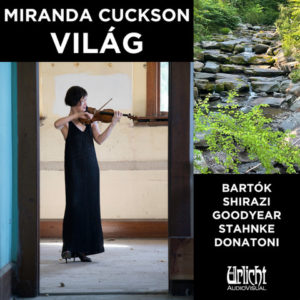 “Világ” is a Hungarian word meaning “world” or “illumination”.
“Világ” is a Hungarian word meaning “world” or “illumination”.
It also resembles the word “village” in English.
In Sanskrit, “vilag” means “to cling to”; in Hindi, “separated”.
I’m very happy to share my new, double-length album Világ, featuring the Sonata for solo violin by Béla Bartók along with compositions written for me by Aida Shirazi and Stewart Goodyear, plus works by Manfred Stahnke and Franco Donatoni.
Download
CD and vinyl LP
Streaming
Liner notes
“Illuminating, not only for its compositional diversity but for Cuckson’s extraordinary playing. In featuring violin alone, her virtuosity, dexterity, and command of intonation and phrasing are on full display, and the performances mesmerize…Whether pitched at a barely audible hush or delivered with an exuberant flourish, Cuckson’s playing is always compelling and never less than transfixing. Anyone who might think nearly 100 minutes of unaccompanied violin might be less than engaging will be otherwise enlightened by Világ. If anything, hearing her performing alone allows for an enhanced appreciation of her singular artistry.” (textura)
“The violin has a rustic side, an ancient call for fiddlers to set the villagers dancing. Miranda Cuckson has always impressed with an effortless command of the hardest modern music. I first heard her on the 2014 album Melting the Darkness, which opens with the dumbfounding “Mikka S” by Iannis Xenakis. It’s an incredibly difficult piece, but Cuckson sounds like she’s crooning a blues lullaby.
Bartók was famous for using folk sources….In conjunction with the idea of “village,” this thread leads to a fresh insight: Cuckson is really a folk musician. Yes, the most advanced kind of folk musician.” (Ethan Iverson, Transitional Technology)
“The protean violinist Miranda Cuckson negotiates with brilliance the technical perils of pieces by Bartók, Shiraz, Goodyear, Stahnke, and Donatoni- imbuing each with impassioned musicality.. The American violinist plays..with an equal balance of temperament and mental acuity, her performance resulting in an intriguing recording of 20th and 21st centuries music. Intelligently annotated and carefully engineered, the URLICHT recording will be welcome addition to the libraries of collectors of off-the-beaten-path music for the violin.” (Rafael de Acha, All About the Arts)
